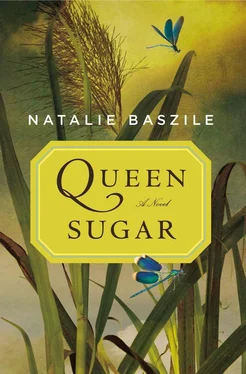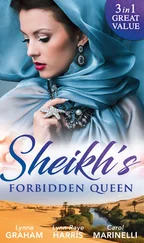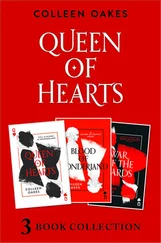“I won’t tell you again, sir. Step out of the car. Do it now. Right. Now.”
Six Mississippi.
“Please, Officer. It ain’t how it looks. I got my kid with me, see? Just give me a second. Jesus . It’s not what you think. I swear to God.” Without thinking, Ralph Angel reached out his hand. “Please. I can explain.” And then he heard the trooper’s gun fire.
In the last week, Charley did everything she could think of to save her farm. She called her suppliers and pleaded for extensions. She went back to the banks. Miss Honey loaned her twelve hundred dollars. Violet asked her congregation for donations. Micah and Blue sold lemonade and baked cookies using Violet’s secret recipe. Denton and Alison insisted on forfeiting their cuts of the profits. Remy tried to work out a deal with the mills.
But nothing helped. The numbers were nowhere near adding up.
And so, on a beautiful, crisp Saturday in October, when a light wind rustled the cane and the roads were clogged with tractors hauling loads to the mill, Charley prepared to meet Landry and Baron.
In the kitchen, Micah’s Polaroids were spread over the table. Charley gathered them into a stack. Here was a picture of her standing at the edge of her fields looking exhausted and overwhelmed the first day they arrived; here was a picture of Miss Honey at the stove. Miss Honey didn’t like being photographed and Charley guessed Micah took it when she wasn’t looking. Here was a picture of Micah and Violet and Micah’s crawfish cake, and here was a picture of the cake that won first place, though they all agreed Micah’s was better. Here was a picture of Micah and Blue that Ralph Angel must have taken. Micah looked so serious, Charley thought, but she liked that she could see Miss Honey’s house in the background and that if you looked close, you could see where all the Christmas lights were still strung across the porch from last year. Blue must have taken the next two, because they were all blurry and out of focus. One was a picture of Ralph Angel’s car, the next, a picture of the bike Blue wanted for his birthday, which Charley remembered was still on sale downtown at the five-and-dime. Here was a picture of Blue and Ralph Angel, both of them smiling the same smile as Blue sat on Ralph Angel’s lap and Ralph Angel wrapped his arms around him. And finally, here was a picture of Micah standing in her garden the week she started it, the ground in the background dark and bare, the newly dug rows evenly spaced. Charley was tempted to ask Micah if she could keep it, but put it back on the table. There would be plenty of time for gardens; plenty of years left for pictures. Charley picked up the picture of Ralph Angel and Blue again, and felt a squeeze in her chest. Her brother was dead. She still couldn’t quite believe it.
At last, Charley slid the picture of Ralph Angel and Blue back into the stack. “I guess I’d better go,” she said, and slung her backpack over her shoulder.
“I just hate the thought of you having to cut a deal with those devils,” Violet said. “I still wish we could have done more.”
Charley loved that Violet wanted to keep fighting, even when it was clear they’d lost. “Three or four years, once I’ve paid off the debt, maybe I’ll try again,” she said.
The hardest part had been breaking the news to Denton and Alison. The morning after Ralph Angel shot John, she found them in the fields setting fire to the acres of dried cane leaves the combine had left behind. There was something unexpectedly beautiful about watching the cane burn.
“She sure looks better with her clothes on,” Alison had said, and after a few startled seconds, Charley realized he meant the cane looked bare without its leaves.
“Guess I’d better dig out my old fishing pole,” Denton had said, stoic as ever, and that was when Charley broke down.
Now Charley patted her pocket for her car keys. She hugged Violet and they stood by the sink, holding each other tightly before Charley pulled away. “This shouldn’t take long. I’ll meet you at the hospital.”
Someone knocked at the front door.
“I got it,” Micah yelled, and in a minute, she walked back into the kitchen followed by Hollywood.
Charley had not seen him since the shooting. Remembering the way he stood with his hands in his pockets looking down at the floor rather than at her, she understood why he hadn’t come around. But her heart swelled at the sight of him and she didn’t hold back.
“It’s great to see you,” Charley said. “How’ve you been?”
Hollywood shrugged. “I’m okay.” He wore his helmet instead of his baseball cap. “I was just on my way — I was heading over to — I mean, I thought I’d—”
“It’s fine,” Charley said, and gave him a look that said all of it — the awful peanut story, his tears of humiliation — was forgotten. “I’m just happy you stopped by. I’ve missed you.” She stepped toward him, extended her hand, pulled him close. When she stood back to give him space, she saw his face had flushed.
“We’ve all missed you, man,” Violet said.
And just then, Miss Honey stepped up from the den. “Is that Hollywood?” She marched over and swatted his arm with a rolled-up TV Guide . “Where’ve you been? My yard looks awful.”
Hollywood beamed then. “I’ve been missing y’all, too. How is everybody? How’s John?”
“He gets out of the hospital today,” Charley said. “We’re meeting Brother over there in a couple hours. As soon as I—” Her voice trailed off.
Violet looked at Hollywood and sighed. “Charley’s losing her farm,” she said, and explained that without The Cane Cutter , there was nothing for Charley to sell at the auction.
“Without the money I would have made from selling the statue, I don’t have money to get through grinding,” Charley said.
Hollywood looked at Charley. “How much do you need?”
“Fifty thousand dollars. At least.” She shook her head. She was tired of saying the number.
“I got fifty thousand,” Hollywood said.
Charley looked at Hollywood standing there in his T-shirt and faded fatigues and sneakers. She looked at his pale blue eyes that always seemed to be searching, and his doughy, open face. She opened her mouth to speak, then closed it.
Finally, it was Violet who said what they all were thinking: “Hollywood Ancelet. How in the world do you have fifty thousand dollars?”
“It’s my grass-cutting money,” Hollywood said, like what do you think I been cutting grass for all those years? “It’s just sitting down at the bank, collecting dust.” He looked right into Charley’s face. “You can have it. You’ve been a good friend to me since the day you got here. I don’t have any use for it. I got everything I need. You don’t even have to pay me back.”
Charley looked through the window into the powder-blue sky and imagined her fields, the rows of cane — her cane, her father’s cane — looking lush and orderly like the fields she passed when they drove in all those months ago. She allowed herself, maybe for the first time, to think her dream would come true. She thought of Micah. She thought of her father.
“You know what Maman used to say about cane farming?” Hollywood said. “She used to say, ‘Cain killed Abel but I ain’t gonna let it kill me,’” then he waited for them to get the joke.
“Of course I’ll pay you back,” Charley said. “I don’t know what to say.”
“How about ‘Thank you, and praise the Lord,’” Miss Honey said. “Why don’t you start with that?”
The dam was across the bay from the Point; out past the state park and the enclave of camps that folks called the Cajun Riviera; out past the marshlands and the cluster of small islands choked with Chinese tallow. Actually, the dam was just a sandbar covered with rocks and sun-bleached oyster shells and railroad ties forming a bridge that straddled the narrow channel. But there was enough space to moor three or four boats if you did it right, and Remy Newell’s boat was tied up with the others.
Читать дальше












